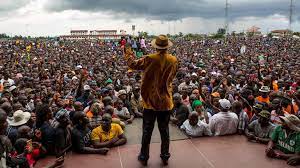The effects of political zoning can be already seen in the current political pyramids and alliances. As cracks in the system are pushing some parties out of one alliance to another. Political zoning may be a new term/trend in Kenya. But zoning has been a critical function in the politics of Nigeria. What is zoning? “Zoning is a survival strategy by the ‘big’ parties who are fearful that the smaller parties within their respective coalition will reap from their dissatisfactory nominations. They are fearful that the Coalition umbrella is double-edged, in such that though beneficial for the presidential candidates, it also gives smaller parties a fighting chance, especially if they field a popular MP/Senate/Governor aspirant,” Charles Mc’olonde – Policy and Governance Analyst. “The logic is simple: every group wants their own share of the cake before anyone begins to talk about merit, as if any single group in the country has a monopoly of talent. This is the Nigerian dilemma,” Reuben Abati- Nigerian Journalist.
Nigeria adopted the concept of zoning after the annulment of the 1993 elections during a National Constitutional Conference after the power takeover by General Sanni Abacha. Prominent leaders advocated for rotating the presidency between the country’s six geopolitical zones (north-central, north-east, north-west, south-east, south-south, and south-west). Although the principle received wide support, the proposal was rejected in favour of a simpler process of rotating the executive between the north and south.
In the Nigerian process a sense of belonging, and participation, to promote national unity, loyalty, and to prevent the overt domination of some sections of the country were the main drive towards the implementation of the zoning system. But in Kenya it seems to be a numbers game, what’s the foreseen impact to the nation? “I believe that it will cripple the will of the people. There might be two able people from a particular area but we end up choosing a mediocre leader all in the name of zoning. It is better to have all the people who want to contest to do so and we elect them on merit basis. This will mean that as a country we have the best leaders to steer us to good governance. We would also fight nepotism and corruption in the process,” Naomi Kilima Advocate.
Over the past couple of elections, the numbers game has always been the polite way of using “tribalism” without using the term public. Will zoning endorse this further? “It is not tribalism per se but as a strategy it will be used as a reward system. It will also create an enabling environment for corruption. It will kill democracy in that all the leaders will have the same mind set. The authentic voices of the Kenyan citizen will be suppressed, Naomi further expressed. “Is it a different form of tribalism, I don’t think. It is monopoly but not necessarily tribalism, for instance Zoning is automatically happening in politically homogenous areas where other Coalition partners has no chance of winning e.g. UDA in Rift Valley, Jubilee in Central, ODM in Nyanza. And where heterogeneous urban areas are zoned for parties, there is no significant tribal shift from the 2013/2017 results,” Charles Mc’olonde further stated.
What’s your view on political zoning is it a new form of public oppression? Or a good strategy for the win?







